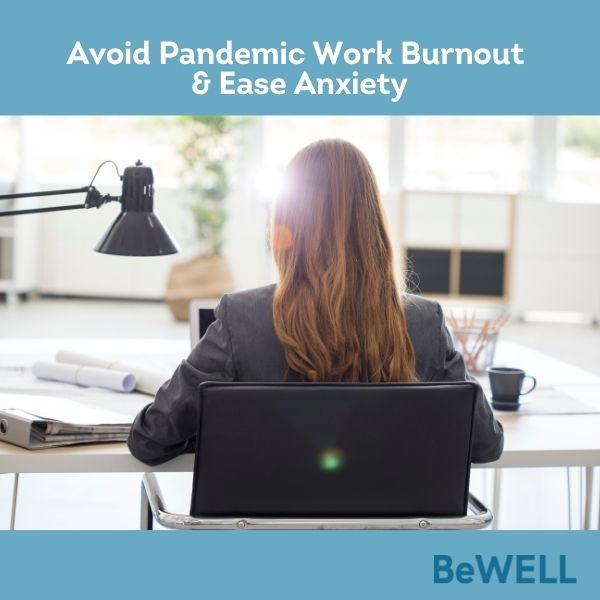By Liz Buehler Walker
In early spring 2021, I hit a metaphorical wall caused by the isolation of working exclusively from home for over a year while parenting my remote-learning 10-year-old. I reached out to a few of my parent friends and set up a standing outdoor playdate which became a lifeline for the kids and adults alike. Within our small group of mom-friends were an intersection of experiences that reflected what so many of us are navigating within our work lives. Discussion topics included caring for special needs children and what that means for working outside the home, panic attacks while working and the need for disability leave to recover and recalibrate, contracting Covid at work, working while caring for sick loved ones or grieving lost loved ones, the realization that some of our jobs were too toxic to make it worth staying and luckily having the ability to leave, and reimagining work and career to reflect values but also the capacity to be well in that work.
Work in general has been challenging at best during the pandemic. Some people took or were forced into pausing and perhaps had the lived experience of better sleeping, eating and exercise habits. Others did work that increased and perhaps forced them into unwanted exposure to illness or infiltrated personal time and space. In a Covid-era survey conducted by Flex Jobs and Mental Health America, 75% of people report having experienced burnout at work. And self-reported mental health struggles jumped from 5% to 18% for employed workers and 7% to 27% for unemployed workers.
So how do we keep going without sacrificing our mental and physical health? Hala Khouri, author of “Peace from Anxiety: Get Grounded, Build Resilience and Stay Connected Amidst the Chaos” teaches about the importance of nervous system regulation plus connecting to bigger collective movements as a way to find peace from anxiety. “Our body is our instrument and knowing some basic practices to keep it balanced and healthy is like knowing that your car needs gas, good tires, and a working GPS in order to make it through a long and bumpy journey in uncharted territory.” Below are some individual and collective practices for mental and physical health as we step into the newest version of work culture and practice.
Individual practices for promoting healthy work boundaries and habits:
Consistency in your eating and sleeping times can help sleep and digestion problems. Find the rhythm of your day that suits your metabolism and schedule. Ayurveda recommends sleeping from 10pm-6am, but do what makes sense for your life.
Grounding practices can help If you are feeling work anxiety: feel your feet on the ground, your seat in the chair. Try some self-massage of upper arms, shoulders, or thighs.
Pause for a deep breath before and after you eat to promote good digestion and mindful eating. Take an actual lunch break.
Set boundaries around your work and ritualize the end of your work. If you are commuting, use that time as a buffer. If you are working from home, change clothing or location when you finish your work for the day. This is especially important if you are feeling work burnout.
Group practices for promoting a healthy work environment:
Communication is key. Talk to your co-workers; and employers, listen to your employees. Some suggestions:
- Shift Workers: ask for a consistent schedule to help with planning childcare and healthy sleeping and eating habits, more frequent breaks to move your body or get outside, better health insurance or more days off
- Office Workers: request a contract that includes work from home days, no-communication times early in the am or late in the evening and on weekends, half days as needed
- Employers: Implement regular (paid) town hall type meetings to hear how the employees are doing and how their needs are shifting, provide weekly communication about internal policies and procedures especially while things are in flux, update policies to account for time off needed for vaccination, testing and sickness or Covid quarantining
Benefits beyond the basic sick days and holidays include wellbeing benefits for mental and physical health. Co-workers, you can come together and find out if your employer will provide or subsidize therapy and health coaching in groups or one-on-one, in house gym or access to gym, dojo or yoga studio memberships.
Some examples from BeWELL on the additional wellness benefits are:
- Individualized financial wellness services, provided by a professional 3rd party provider
- In depth and on-going anti-racism training to sustain a culture that reduces racialized harm, facilitated by a professional 3rd party provider
- Employee appreciation outings and in-office lunches and events
Participation in systemic change to promote collective wellbeing:
Being part of systemic change can ease anxiety and burnout by adding the WHY to your work and wellness practices. Ultimately physical and mental wellness offer the capacity to participate in larger change coming from your specific place of need or level of resources.
Support the Fight for 15.
Get Involved with your labor union or other workplace improvement projects.
Advocate for Medicare for All. Employers, especially small business owners, would benefit from easing the company’s healthcare burden and could provide meaningful additional wellbeing benefits.
Address who holds leadership and power positions in your company and board of directors to reflect various identities, lived experiences, and areas of expertise.
Suggest which grass roots organizations your company should support and uplift. The organizations supported financially and actively by BeWELL are L.O.V.E. Latinas on the Verge of Excellence, The Loveland Foundation, and Make A Difference.
Going Back to Work Doesn’t Have to Make You Sick
We’re entering a new phase of work amidst continued uncertainty, and it can understandably cause anxiety. But going back to work doesn’t have to make you sick.
And you don’t have to do it alone. Our individual, workplace, and collective wellness are needed to move forward. In her article “The Pandemic Has Created a New Kind of Burnout, Which Makes Well-Being More Critical Than Ever”, Naz Behesti points out “As the economy reopens and we move toward some semblance of normalcy, we must keep in mind that economic recovery will be fragile unless a well-being recovery accompanies it.”
Add these tools and ideas to your already existing resources for a more mindful work and life experience. It’s truly all connected, and workers and employers alike, in all industries and types of work, deserve mental and physical well-being.
Resources:
Flex Jobs and Mental Health America Survey
Hala Khouri
Fight for 15
“The Pandemic Has Created a New Kind of Burnout, Which Makes Well-Being More Critical Than Ever”
-Naz Behesti
L.O.V.E. Latinas on the Berge of Excellence
The Loveland Foundation
https://thelovelandfoundation.org
Make A Difference




